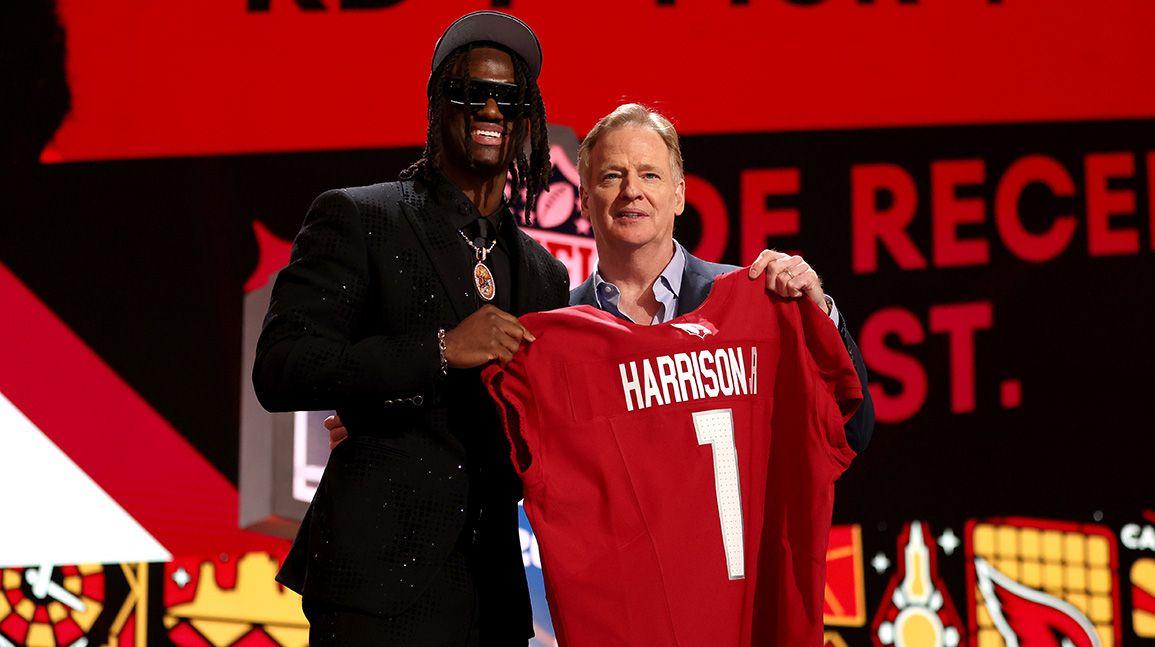The legal battle between Marvin Harrison Jr. and Fanatics has taken another unexpected, strange turn.
The Arizona Cardinals rookie wide receiver said in court filings the contract that gave Fanatics his exclusive autograph rights for trading cards might have been signed by his company — but it was never signed by him.
That's according to two affidavits recently submitted to a New York court suggesting the former Ohio State star and his father, Hall of Famer Marvin Harrison Sr., might not have been working together.
In May 2023, Fanatics entered into what it calls a "fully binding and enforceable contract" giving the company trading card autographs until 2026 in exchange for more than $1 million, with bonuses for awards, including Rookie of the Year, MVP, winning a Super Bowl and Super Bowl MVP.
But Harrison Jr. says he didn't agree to that deal.
"It is not an agreement between Fanatics and me," Harrison said in an affidavit. "I was never requested to, nor did I ever, sign any document that personally obligated me to do anything concerning the 'Binding Term Sheet."
So who signed it?
Harrison Sr. represented to the court in his affidavit he signed it as an authorized representative of the company, The Official Harrison Collection LLC, but that the deal didn't require his son, the sole representative of the company, to be legally bound.
It is legally possible for a company's sole representative not to be bound by something signed by an authorized company representative — though it is hard to believe.
Andrew Staulcup, the attorney who represents both Harrisons, told cllct he does not comment on his cases. Attorneys for Fanatics also declined comment.
"This is a mess," said attorney Darren Heitner, who has set up many "loan-out" companies for athletes over the last 15 years. "It's very common for athletes to set up LLCs to furnish their services because it limits their personal liability and gives them tax-related benefits. And 99.9 percent of the time, it's a no-brainer.
"This appears to be that one situation where the structure seems, at least based on the filing, completely disorganized. Fanatics has a strong case here that Harrison's entity at least had apparent authority to obligate him to perform certain services."
The two affidavits were entered in the case as part of the Harrisons' motion to dismiss Fanatics' lawsuit against the No. 4 overall pick in the 2024 NFL Draft, which was filed in May.
In open court in New York on Thursday, the judge denied that motion and allowed Fanatics to make an amended complaint, which is due in two weeks. The Harrisons also asked for a delay in discovery in the case, which was denied by the judge.
Fanatics attorneys argue the contract was already validated by Harrison Jr., as he signed autographs under it and was paid more than $110,000 in total in payments that came in August and October 2023.
Harrison Jr., in his affidavit, stated he was not paid. Instead, his company was. And Fanatics wasn't the payor. Topps was. For those scoring at home, Fanatics is the parent company of Topps.
The rookie further represents the distance between his company and himself by mentioning his company has a separate bank account and has entered into contracts that do not include his services.
The Official Harrison Collection LLC was registered in the state of Pennsylvania in February 2023 before the entity signed its first deal with Fanatics. The entity, at least on the surface, appears to be a company very much tied only to the player.
After Harrison's stellar junior season at Ohio State, to no one's surprise, he announced he declared for the NFL Draft, meaning Fanatics would have his rights for the first two seasons of his pro career. It's an important chess move for Fanatics because the company won't have the license to make cards with NFL logos on it until March 2026. Having an exclusive with Harrison keeps him away from competitor Panini.
Harrison Jr. will make history when he makes his preseason NFL debut against the Saints on Saturday night. Jerseys for the first-rounder will not be available at State Farm Stadium or at any venue or website for that matter.
In at least the last 20 years, as jersey making has become turnkey, no top draft pick in any major U.S. pro men's sport has ever had his jersey unavailable the first time he plays his first minute.
When Harrison was drafted April 25, he took the stage with Roger Goodell and they, together, held up a No. 1 Cardinals jersey. It was the only one ever made.
In the coming days, Harrison chose not to sign the NFLPA's group licensing agreement that would permit all retailers such as Fanatics to use his name and likeness. His camp contended it did not have an autograph deal with Fanatics and potentially chose to use the fact Fanatics wouldn't be able to sell his jersey as leverage.
For the next couple of weeks, Fanatics said Harrison refused to participate in any promotional events or sign any trading cards. He also, the suit claims, presented Fanatics with competing offers and asked Fanatics to match them.
Fanatics then filed a lawsuit against Harrison Jr. and his business, The Official Harrison Collection, in New York State Supreme Court, accusing Harrison of breach of contract and tortious interference.
Said Fanatics attorneys in the suit: "No other athlete has ever repudiated its deal with Fanatics, and no other athlete has ever risked hurting the fans to try to leverage more money – other than Harrison Jr."
Darren Rovell is the founder of cllct.com and one of the country's leading reporters on the collectible market. He previously worked for ESPN, CNBC and The Action Network.

